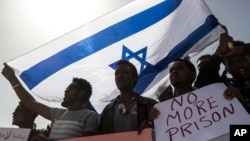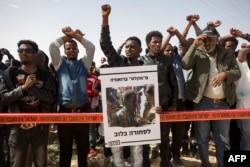Thousands of African migrants in Israel are facing growing uncertainty as a looming deadline for deportation approaches.
"We are refugees, we are not criminals!" chanted dozens of protesting migrants, some of them symbolically wrapped in chains.
The slogan goes to the heart of the tug of war between some 40,000 Africans who entered Israel illegally over the past 12 years and the Israeli government, which describes them as economic migrants and "infiltrators."
Ovdat Ishmail, who came from Eritrea, says Israel's plan to deport the Africans is wrong.
"We did not come to Israel seeking work, we are not economic migrants, and we are not infiltrators," he said, adding that they are refugees who fled from war-torn Eritrea and Sudan.
Israel rejects the refugee claim and says it has made the Africans a fair offer: They can take $3,500 and a one-way plane ticket to Rwanda by early April, or face imprisonment.
Most of the migrants say they prefer prison in Israel to returning to Africa where their lives will be in danger. About a dozen asylum-seekers were thrown in jail this week.
Ishmail says they were rounded up without warning and didn't even have a chance to gather their belongings.
The crackdown has been condemned by Israeli human rights groups, which say that since Israel was built by refugees from the Holocaust, the country has a moral obligation to help those facing a similar fate.
Anat Ben Dor, director of the Refugee Rights Clinic at Tel Aviv University, said Israel is obligated under international law to protect the refugees, since sending them back to Africa poses a threat to their lives.
Ben Dor also noted that Rwanda denies the existence of any agreement to take them in. She says those refugees who have gone there from Israel have no civil rights and are often mistreated and expelled.
But Israeli officials insist that Rwanda is a safe destination for the Africans, whom they see as a menace. The government accuses them of undermining the Jewish character of the state and bringing poverty and crime to the streets of South Tel Aviv.
Parliament member Yoav Kish of the ruling Likud party dismisses any connection between the migrant crisis and the Holocaust.
He accused human rights activists of cynically distorting the truth, saying the Jewish people do not need self-righteous lessons in morality.





